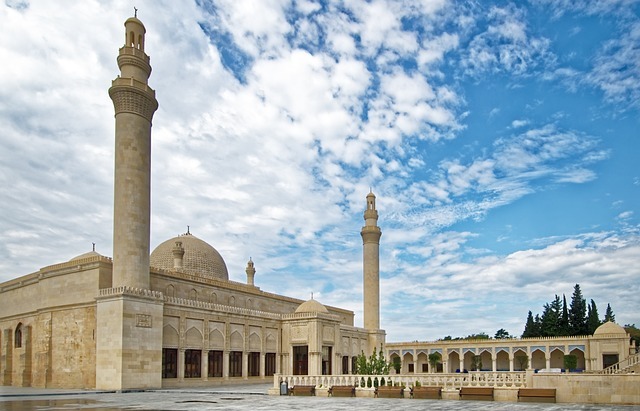The Jewish state can be a friend to both Azerbaijan and Armenia.
Michael Rubin
(JNS)
Concluding a visit to Azerbaijan on July 13, Israeli Defense Minister Yoav Gallant was effusive. He praised the two countries’ “shared commitment to take our ties to the next level” and “the potential for defense, industrial and military exchanges is only growing. Azerbaijan is not only a strategic partner but also an asset.”
Certainly, this bilateral partnership has paid dividends, but too enthusiastic an embrace could increasingly transform these ties into a liability.
The roots of the Azerbaijan-Israel energy-for-access-and-weaponry relationship date to 1992. At the time, both countries were isolated within their own neighborhoods. Both faced Iranian hostility, Azerbaijan because Tehran could not tolerate a Shiite state more successful than Iran’s own theocracy and Israel because the Islamic republic denies its right to exist. Azerbaijan’s nearly 500-mile frontier with Iran also provided Israel an opportunity to monitor developments in Iran, if not infiltrate operatives into it.
At the same time, Israel needed Azerbaijani gas. The Jewish state had not yet developed its eastern Mediterranean gas fields or its solar plants. Nor, prior to the Abraham Accords, did it have access to Abu Dhabi’s considerable gas exports. Israel also lacked today’s access to Iraqi Kurdistan, a region that provides even greater access to Iran.
Even while allied, Israel and Azerbaijan diverged. Thirty years ago, Israel was a democracy in a sea of dictatorships. Any hope that Azerbaijan might embrace democracy ended after a coup ousted Abulfaz Elchibey in favor of Heyder Aliyev, a Soviet-era Azerbaijani KGB chief and Soviet politburo member. His son Ilham has ruled the country with an iron fist since his father’s 2003 death.
Geopolitics also changed. Azerbaijan was a dictatorship, but it was pro-Western. Armenia was under Russia’s thumb. That changed in 2018. Armenians rose in revolution and embraced democracy. Today they seek to reorient themselves firmly towards the West and view Russia with deep cynicism if not hostility.
Azerbaijan, meanwhile, has become Russia’s chief mechanism—except for Turkey—to evade sanctions and launder money. If Armenia is a Russian puppet as some lobbyists claim, then it is a strange one: It exercises with the U.S. Army, joined a NATO-led peacekeeping force in Kosovo and stood up to Vladimir Putin by cancelling Russian military exercises on its own soil.
Proponents of strong Israel-Azerbaijan ties say Azerbaijan is friendly towards Jews and claim Armenia is antisemitic. This is nonsense. Azerbaijanis often point to their large Jewish community. Like Iran, however, they use decades-old numbers that ignore emigration.
Nor should outsiders confuse Azerbaijan’s museumification of its remaining Jews with freedom. I have visited synagogues in both Iran and Azerbaijan. A similar tension permeates both. Armenia’s Jewish community, meanwhile, grows as Jews from Russia and Ukraine swell its ranks.
While antisemitism exists in both Armenia and Azerbaijan, the majority of Armenians are friendly towards Jews. In May, I stopped at a children’s library in Goris unannounced. On one shelf were multiple copies of The Diary of Anne Frank translated into Armenian and the art projects the book inspired among local children. I later had breakfast with Armenian Jews involved in business, documentary filmmaking, education and cyber start-ups. Their energy was palpable. Many traveled regularly to Israel.
That Israel sells military equipment to Azerbaijan as Aliyev blockades Nagorno-Karabakh’s indigenous Armenian community, sandblasts Armenian inscriptions from centuries-old churches and bulldozes graveyards betrays Israel’s long-term interests. It also weakens Israel’s efforts to preserve Jewish cultural heritage in Palestinian-controlled territory. Israel’s rejection of Armenia’s security needs also undermines any precedent Jerusalem hopes to use to convince the international community to recognize its needs for defensible borders.
Last month, Ayoob Kara, a former Israeli minister of communication, compared both myself and former Senator, Governor and Ambassador Samuel Brownback—both staunch and unapologetic Zionists—to progressive and arguably antisemitic “Squad” members like Rashida Tlaib (D-Mich.) and Ilhan Omar (D-Minn.) because we challenged the wisdom of blind Israeli support for Azerbaijan.
The simple fact is that Israel need not abandon relations with either Azerbaijan or Armenia, but it should recognize that an unconditional embrace of Azerbaijan increasingly comes at a high moral, geopolitical and strategic cost. Israel has broader options today on its core security interests than it did just five years ago. Rather than enable Aliyev’s ethnic cleansing of Armenians, a more farsighted Israeli policy would use its influence with Baku to restrain the worst impulses of Azerbaijan’s dictator.


